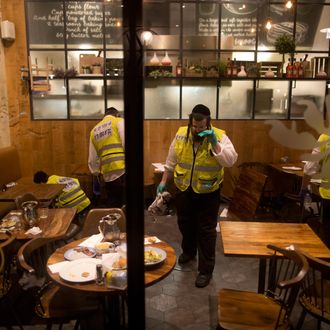
Last week, two men dressed in black suits walked into Tel Aviv’s popular Max Brenner chocolate bar. They sat down and ordered food. Then they pulled out assault rifles and opened fire randomly, killing four patrons and wounding several others and sending a wave of panic through the surrounding shopping complex. The gunmen were a pair of Palestinian cousins who lived near Hebron in the West Bank, and both were apprehended, one after being shot and wounded by police. As the Times reported, the attack “reignit[ed] fears of terrorism in Israel just as a recent wave of Palestinian attacks had seemed to be waning.”
Inside Higher Ed notes that one of the murdered victims was Michael Feige, a sociologist at Ben-Gurion University of the Negev. Feige, the university’s announcement explains, was the author of a 2009 book called Settling in the Hearts: Jewish Fundamentalism in the Occupied Territories, which “won the Shapiro Prize for Best Book from the Association for Israel Studies in 2010.” According to the book’s description, Settling in the Hearts is a work of ethnography that examines Gush Emunim, a “fundamentalist religious movement [that] became a political force by constructing settlements within contested territory and is one of the key players in the Israeli–Palestinian conflict.”
The description continues:
In the first section of this volume, Feige explores how the Gush Emunim settlers reinterpret Jewish history, secular Zionist ideology, religious faith, and the Bible to discern the settlers’ attitudes toward the Jewish exile experience. Feige identifies the crucial principles at work in the settlers’ attempts to appropriate land, particularly in their use of collective memory, referring both to ancient times and to more contemporary events.
In the second section, he presents fascinating case studies of Jewish settlements that Gush Emunim built beyond the green lines, in important symbolic centers such as Hebron, Ofra, and Gush. The concluding section analyzes the contemporary changes, conflicts, and crises that have affected Gush Emunim in the last year. Settling in the Hearts is based on a variety of qualitative sources, including interviews, participant observation, settlers’ publications, and visual documents. Its novel way of understanding one of the most crucial factors affecting Israeli society and the Israeli–Palestinian conflict will be of interest to Israeli and Middle Eastern studies scholars and readers wanting to learn more about the complex dynamics of politics in the Middle East.
In other words, Feige was someone who had devoted his career to studying the Israeli-Palestinian conflict and better understanding the motives of the settlers who have, with plenty of help in the form of the Israeli government’s settlement policies, played a huge role in exacerbating that conflict. The attackers can’t have known this, of course, and surely if they had it wouldn’t have mattered to them — their goal was to murder as many people enjoying a chocolate snack on a late-spring day in Tel Aviv as possible, and some of their fellow radicals celebrated and justified the shooting spree (hat tip to Will Cubbison for bringing my attention to this tweet):
It would be hard to come up with a more depressing symbol of the futility of the Israeli-Palestinian conflict — of the endless, senseless trauma and loss of life — than an Israeli-Jewish scholar who tried to understand why some Jews appropriate and occupy Palestinian land getting murdered by Palestinian radicals who were surely motivated in part by that occupation, all in a city that’s not even part of the occupied territories.





























